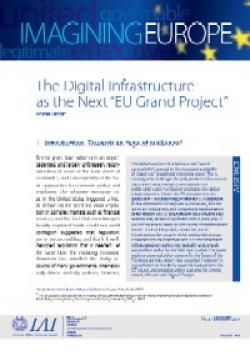The Digital Infrastructure as the Next "EU Grand Project"
The global economy is entering a new "age of connectivity", spurred by the increased availability of "always on" broadband communications. This is creating new challenges for policymakers: infrastructure and connectivity emerge as key priorities for public policy and essential preconditions for global competitiveness. How is the EU positioned in this global race? This paper argues that the EU's approach to the information society was ill-conceived, and has led to an unnecessary and undesirable fragmentation of the market. Key EU policymakers have realized only recently that, absent a significant shift in pace, the EU will not be able to keep up with global competitiveness due to a lack of integrated, connected, smart infrastructure. Key areas in which substantial change is needed include incentives and PPPs for broadband rollout, spectrum policy, net neutrality and, overall, competition policy for the high-tech market. The paper explores potential policy options for the future of the EU digital agenda, argues that a gradual "evolution" is not sufficient for the EU to regain its leadership in the ICT sector, and proposes policy scenarios for a more united, effective and "digital" Europe.
Paper produced within the framework of the project "Towards a More United and Effective Europe". Presented at the IAI conference on "Infrastructure, transport and communications in post-crisis Europe", Rome, 20 January 2014.
-
Details
Roma, Istituto affari internazionali, 17 January 2014, 32 p. -
In:
-
Issue
3
1. Introduction: Towards an "age of resilience"
2. The Digital Agenda: erase and rewind?
2.1. The EU regulatory framework for electronic communications
2.1.1. A retrospective look at the 2002 e-communications framework
2.1.2. The Digital Single Market: an "impossibility theorem"
2.1.3. The myth of "better regulation"
2.2. The "Connected Continent" proposal
2.2.1. Net neutrality in the Connected Continent: five syndromes to be avoided
2.3. Tragic choices: Connected Continent and the dynamic nature of the Internet
2.4. Beyond the telecoms package: how growth-friendly is the EU acquis?
3. Scenarios for future action
3.1. Quick fixes: reforming the telecoms package
3.2. More ambitious actions
4. Towards a more united and effective Europe: is digital infrastructure the next "EU grand project"?
References



